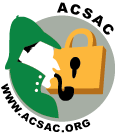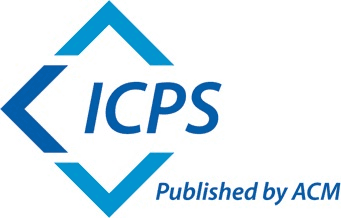2013 Annual Computer Security Applications Conference
Call for Workshops
- When are workshop proposals due?
- Workshop proposals are due no later than June 10 June 1. Moderators will be notified of Acceptance/Rejection by August 15.
- What is a workshop, and how does it differ from a paper or panel?
- A workshop is a full day (approximate five to six hours) interactive dialogue of a topic between multiple presenters and the workshop participants. Past workshops have provided a useful and exciting forum for members of the standards and software development worlds to exchange ideas, opinions, and concerns. The workshop provides participates with opportunities to exchange their views on the workshop topic.
An ACSAC workshop is not:
- A report on your research.
- A general course on Computer Science.
- An attempt to market your product.
- What are good workshop topics?
- Many topics are suitable for workshops. The best workshops, however, relate either to technology areas or techniques. Extremely narrow topics, such as VMS security, are probably not appropriate for a broad conference such as ACSAC.
A topic may be submitted for both a workshop and a tutorial, however, the same topic will not be scheduled as a workshop and a tutorial at the same time.
- Recent workshop topics
- The following is a list of past workshops presented in chronological order: Software Assurance, Host Based Security Assessment, Malicious Software, Trusted Computing, Secure Web Services, Forensics, Personal Firewalls, Enterprise Security Management, Multimedia-Security, Intrusion Detection, Securing the Road Warrior, Smart Cards, and Trusted Computing Since last year's topic was Host Based Security Assessment it probably should not be submitted this year unless there is a different coverage from last year. Pervious years presentations are located on the Conference web page.
- What do I need to have ready for workshop submission?
- Unlike papers, the workshop does not need to be completely developed at the time of submission. However, there must be a relatively firm outline of the workshop, including preliminary thoughts of how the workshop will be run and allocations of how time is to be allocated to each section of the workshop. You do not need to provide a general computer security overview.
- How do I structure a workshop submission?
- Workshop submissions are handled very differently than are papers or panel proposals.
Workshop submissions should have the following structure:
- Title of the workshop
- One to two paragraphs of introductory text about the workshop.
- One to two pages of outline for the workshops. The main section level should provide rough time estimates.
- Identification of the author of the workshop, including contact information (mailing address, email, fax, phone)
- One to two paragraphs of biographical information about the moderators.
- How do I submit a workshop proposal?
- Workshops should be submitted electronically to the Workshops Chair. An alternate contact address is hhr@mitre.org.
Workshops may be submitted in any of the following form:
Preferred Formats: Microsoft Word 2000 or earlier, Rich Text Format, or Text.
Acceptable Formats: HTML, or PDF.
If you cannot submit a workshop electronically, please mail it to:
Harvey Rubinovitz
ACSAC Workshops Chair
The MITRE Corporation M/S S145
202 Burlington Rd
Bedford, MA 01730
- What happens if my workshop is accepted?
- If your workshop is accepted, here's what you can expect.
- By mid-August, you will need to provide an updated version of the workshop proposal for the Advance Program. For this, it is critical that the workshop be described accurately, and the outline be correct.
- By October 1st, you will need to provide an updated version of the proposal with additional information describing the major topics that will be covered during the workshop.
- Who do I contact for more information?
- If you have any questions on the workshop program or the workshop submission process, please contact the Workshops Chair. An alternate contact address is hhr@mitre.org.






